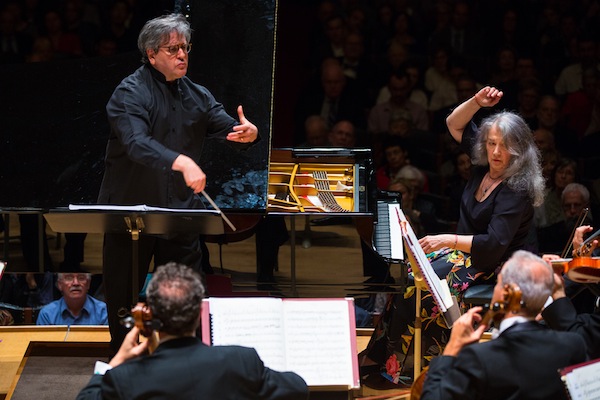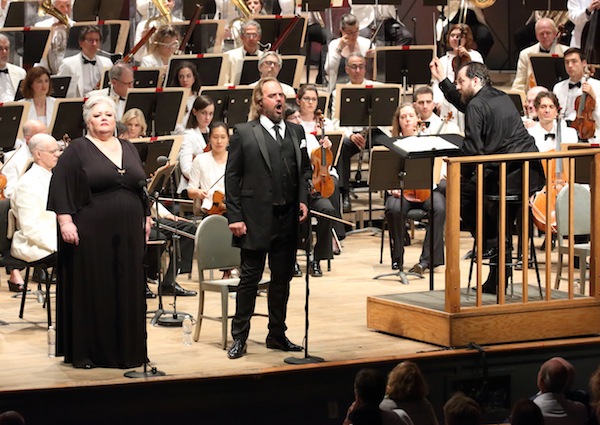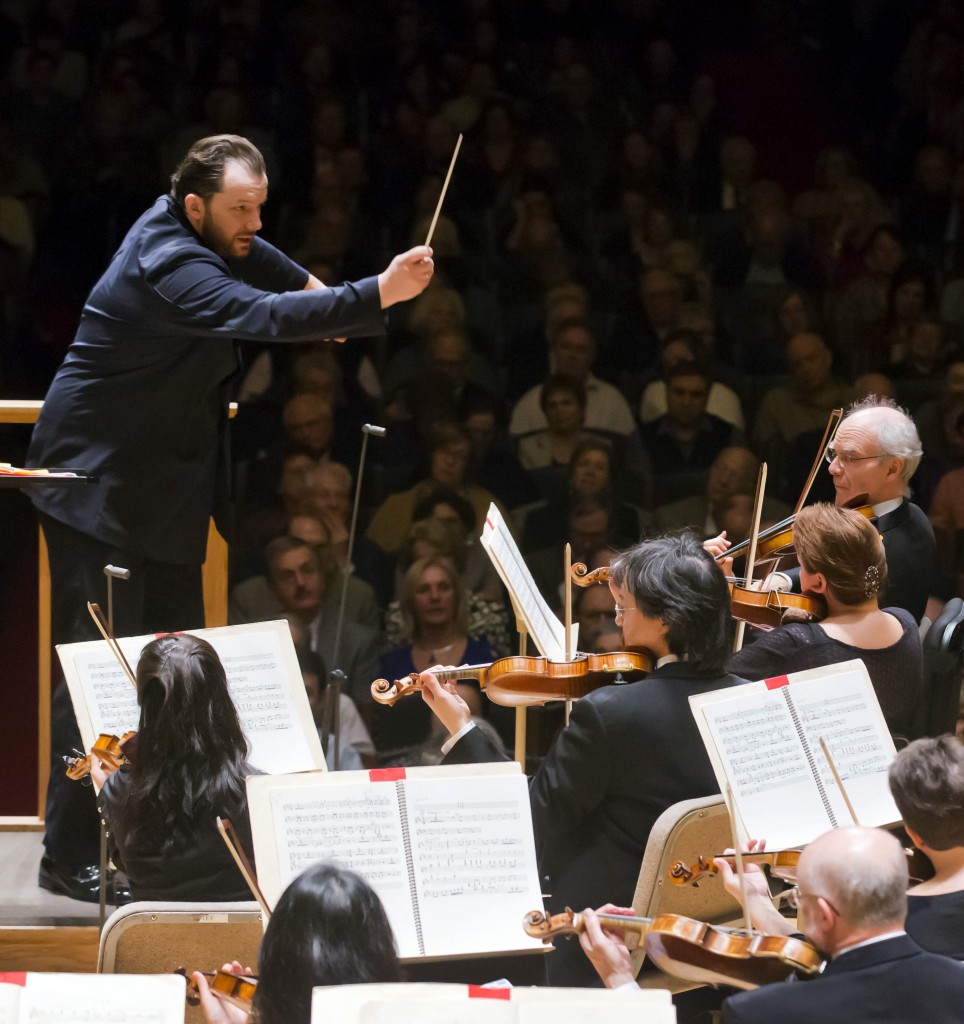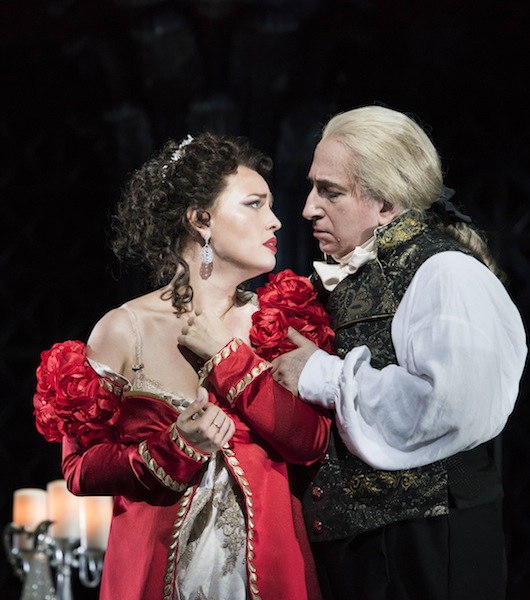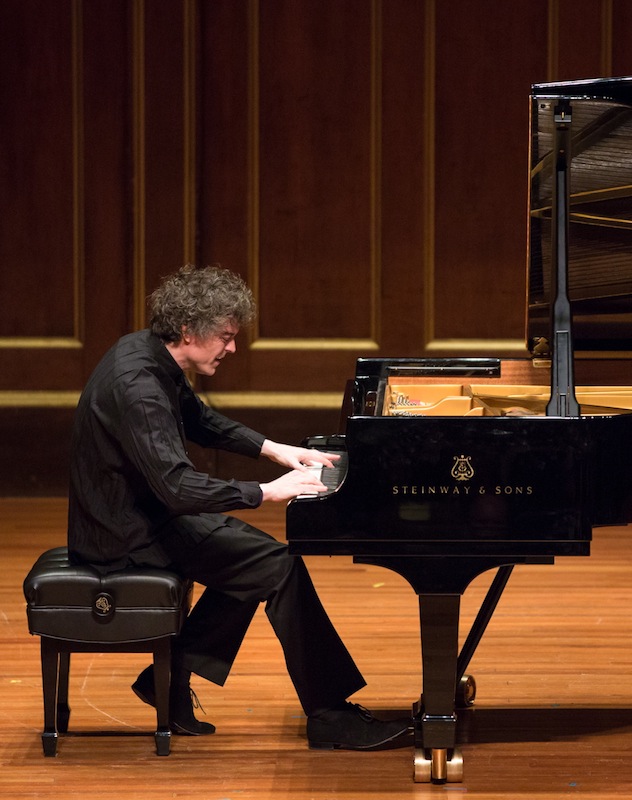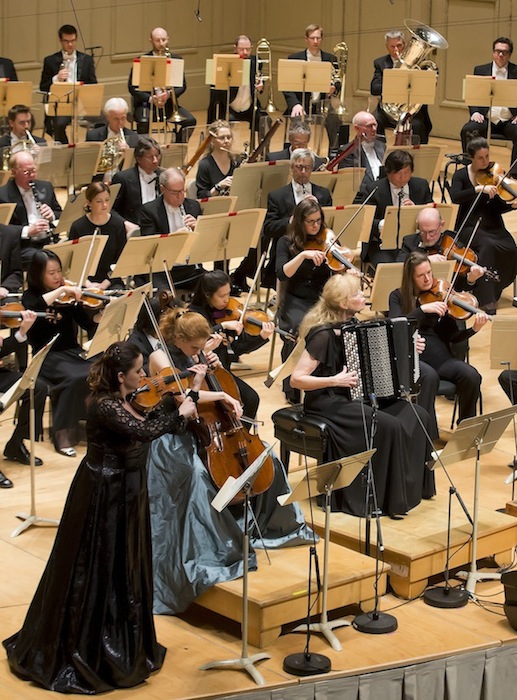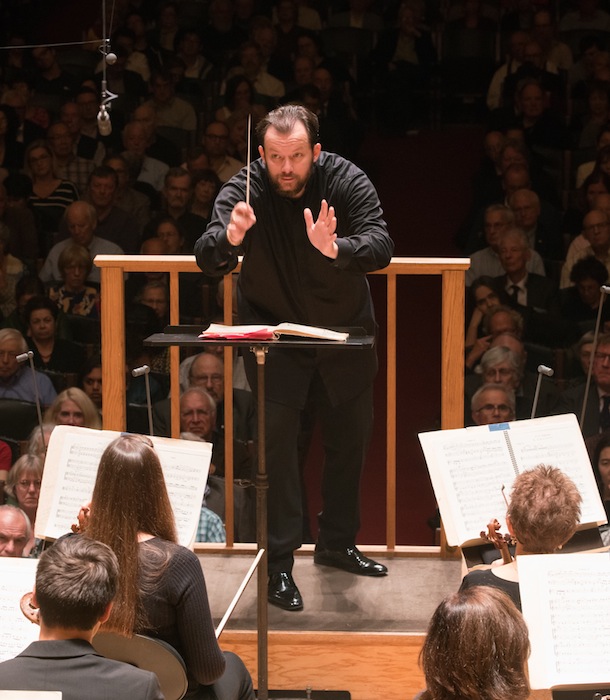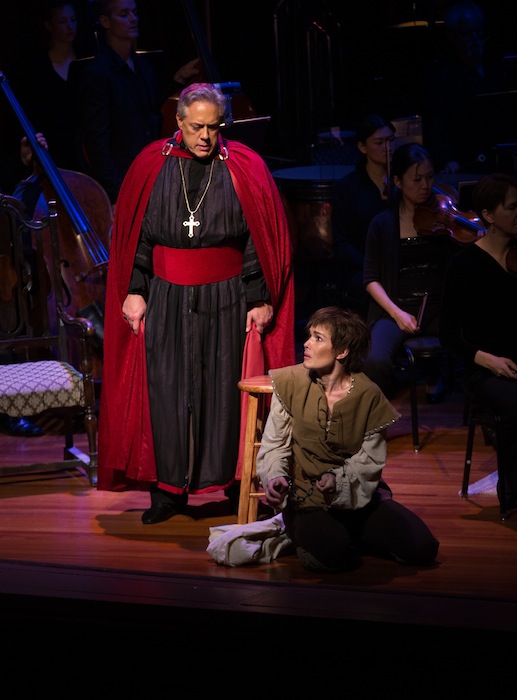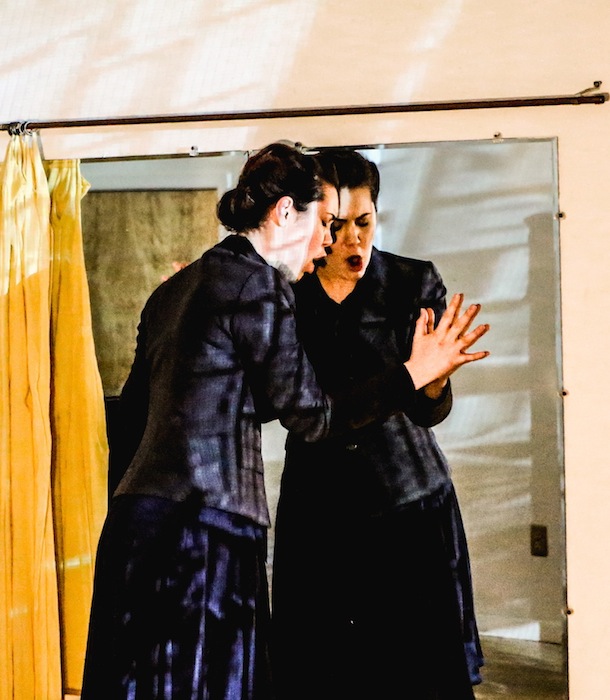Top Ten Performances of 2017
Bostonians were treated to a musical luminary this past fall when pianist Martha Argerich made a rare appearance at Symphony Hall with the Orchestra dell’Accademia Nazionale di Santa Cecilia, presented by the Celebrity Series. At 76, the Argentine pianist has retained much of her blazing technique. But her performance of Prokofiev’s Piano Concerto No. 3 offered more than fireworks. Even in the technical passages she crafted the music with an eye to the musical phrase, and the concerto’s soft sections had a warm, singing quality. There was also color, and the second movement’s mix of chamber-like intimacy and biting sarcasm making this performance stand out as the year’s best.
2. Wagner’s Das Rheingold. Andris Nelsons, soloists and the Boston Symphony Orchestra.
Andris Nelsons’ falling out with the Bayreuth Festival last year has been Tanglewood’s gain, and this summer the conductor led the Boston Symphony Orchestra and a starry cast of soloists in Wagner’s Das Rheingold, the first work of the Ring tetralogy. The principals, headed by Thomas J. Mayer as Wotan, Stephanie Blythe as Fricka, and Jochen Schmeckenbecher as Alberich, are veterans of Wagner performances at the Metropolitan Opera and Bayreuth Festival, and each sang with power and conviction that brought these characters to vivid life. One hopes that this Das Rheingold will be the start of more concert performances of Wagner operas in Tanglewood and Symphony Hall.
3. Mahler’s Symphony No. 2. Benjamin Zander and the Boston Philharmonic.
The music of Mahler is a specialty for Boston Philharmonic conductor Benjamin Zander. Recent seasons have featured him leading the orchestra in the composer’s First, Fourth, and Ninth Symphonies. But this year’s performance of Mahler’s Symphony No. 2, Resurrection was a palpable journey from darkness to light. As is often the case with Zander’s performances of Mahler’s works, details were aplenty. What made this reading stand out, though, was its sense of the musical line and an interpretation that reached into deep spiritual depths. The singing of Chorus pro Musica and soloists Claudia Huckle and Sonja Dutoit Tengblad matched the glow and splendor of the orchestra’s sound.
4. Shostakovich’s Symphony No. 7. Andris Nelsons and the Boston Symphony Orchestra.
The most successful venture of Andris Nelsons’ tenure with the Boston Symphony Orchestra has been his survey of Shostakovich’s Symphonies. That trend continued this year when Nelsons led a bracing rendition of the Symphony No. 7. Nelsons’ reading of the Leningrad found the work’s surging power and an intensity that captured the haunting wartime events that inspired in detail. The conductor also minded the composer’s characteristic irony from the score, and the ending was a culmination of Mahlerian proportions.
5. Puccini’s Tosca. Boston Lyric Opera.
Puccini’s Tosca remains a popular work for opera companies and audiences alike, and Boston Lyric Opera’s traditionally staged production from this past fall revealed why that is the case. With singing of urgency and conviction, this Tosca stands as one of BLO’s most successful performances of the last few years. Visually, the production’s costumes offered a splash of color, with the set framing the reds, browns, and blues within a dark canvass. The performance was superb, and the musical accompaniment led by conductor David Stern spun Puccini’s rich, lyrical melodies in grand arcs of sound. The star of the show was Elena Stikhina, who made her American debut as the titular character.
6. Paul Lewis. Celebrity Series.
This season has witnessed pianist Paul Lewis in several Boston performances. With the Boston Symphony Orchestra, he offered an account of Beethoven’s Piano Concerto No. 4 that was shaped with classical precision and grace. But his Celebrity Series performance from this past spring lingers in the memory. His smooth and creamy-toned renditions of sonatas and waltzes by Weber and Chopin had just the right touch of poetry and romantic reverie.
7. Sofia Gubaidulina’s Triple Concerto. Andris Nelsons and the Boston Symphony Orchestra.
Many new works played by the Boston Symphony Orchestra disappear after the first performance. This year, however, the orchestra delivered the premiere of Sofia Gubaidulina’s Triple Concerto, a searching and intense piece that will hopefully be heard for years to come. The thirty-minute concerto is bathed in dark colors, yet there are challenging sections for the three solo instruments—violin, cello, and bayan, a Russian accordion. The fine playing of soloists—violinist Baiba Skride, cellist Harriet Krijgh, and bayanist Elsbeth Moser—made a strong case for this introspective score.
8. Shostakovich’s Symphony No. 11. Andris Nelsons and the Boston Symphony Orchestra.
Nelsons’ contract extension through the 2021-2022 season has allowed time for more performances of Shostakovich’s symphonies. This past fall showcased the BSO in its premiere of the composer’ crushing Symphony No. 11, The Year 1905. With its quotes of revolutionary songs and dark lyricism, the work feels like film music to a movie that was never made. But Nelsons is a master of densely packed scores such as this one, and his reading glistened with detail and drama. As with the other Shostakovich works heard over the past few seasons, this performance should make a fine future recording.
9. Norman Dello Joio’s The Trial at Rouen. Odyssey Opera and the Boston Modern Orchestra Project.
American operas are rarely heard in Boston, but this past month witnessed the revival of a rare treat in Norman Dello Joio’s The Trial at Rouen. Based on the last few hours of Joan of Arc’s life, the opera began as a work for television but quickly fell into obscurity. December’s semi-staged production was the opera’s belated stage premiere. And a fine one it was. The singing of Heather Buck (Joan) and Stephen Powell (Bishop Pierre Cauchon) transformed the familiar story into an emotionally resonant human drama. Dello Joio’s attractive music, with its lyrical melodies and colorful orchestration, makes this a piece that deserves to be heard more often. Kudos to Gil Rose, the fine cast and chorus of Odyssey Opera, and the Boston Modern Orchestra Project for shedding new light on this intriguing work.
10. Schumann and Argento song cycles. Boston Opera Collaborative.
Schumann’s Frauenliebe und -leben is a frequent recital item in Boston these days. But the fine singer-actors of Boston Opera Collaborative transformed the cycle and Dominick Argento’s From the Diary of Virginia Woolf into a memorable theatrical experience. The singers paired songs from each cycle in eight scenes that unfolded the lives of women through joy, madness, and the experience of death. Simple sets transformed many of the rooms in the Longy Conservatory’s Zabriskie House into intimate stages, and when telling the poignant stories of these characters, sometimes that is all that needed.
Honorable Mention
Gloriae Dei Cantores, an enterprising choral ensemble stationed at the Church of the Transfiguration on Cape Cod, teamed up with Elements Theatre Company to bring Vaughan Williams’ Pilgrim’s Progress to New England for the first time in twelve years. Sister Danielle Dwyer’s production and choreography brought color and zest to Bunyan’s depiction of Pilgrim’s spiritual journey. And the fine singers and orchestra found the pastoral glow of Vaughan Williams’ beloved score.
A most unusual BSO premiere
Ferruccio Busoni’s Piano Concerto, with its mix of crash-and-bang intensity and musical mysticism, is one of the most curious works ever to grace the stage at Symphony Hall. The 75-minute piece even involves a men’s chorus in its final movement. Its robust technical passages were no problem for pianist Kirill Gerstein, who delivered a transfixing performance in its belated BSO premiere this past March.
Most belated debut
Terry Riley has travelled many musical paths, but the Boston Symphony Orchestra has never performed any of his music until this past January when Bramwell Tovey and organist Cameron Carpenter offered the world premiere of the composer’s At the Royal Majestic, a broad and searching work for organ and orchestra. Cast in three movements, the concerto brings together African-American theater music and chant-like melodies drawn from Tibetan religious ceremonies. Tovey and Carpenter, for whom the work was written, delivered a performance of otherworldly mystery.
Best new opera
Boston Lyric Opera found additional success this past fall with the world premiere of Julian Grant’s latest piece, The Nefarious, Immoral but Highly Profitable Enterprise of Mr. Burke and Mr. Hare. Though it conjured the story of two notorious murderers who deliver corpses to an Edinburgh medical school for profit, the opera has a powerful social justice message that, without being preachy or trite, reminds listeners not to turn a blind eye to those in need. Driving this twisted drama was the exceptional singing of William Burden as Dr. Knox, Craig Colclough as Hare, Jesse Blumberg as Burke, and the stellar cast who portrayed the victims.
Posted in Articles
